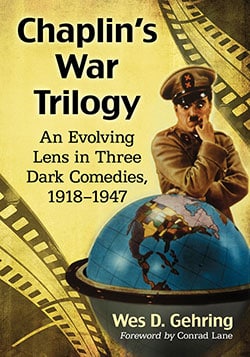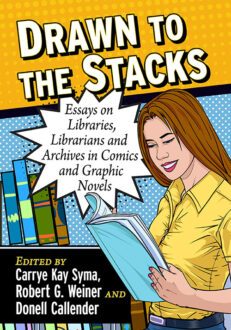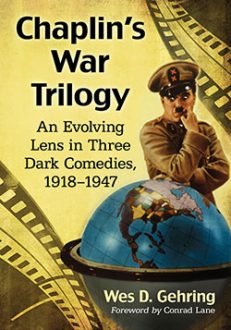Chaplin’s War Trilogy
An Evolving Lens in Three Dark Comedies, 1918–1947
Original price was: $39.95.$19.99Current price is: $19.99.
In stock
About the Book
The book examines Charlie Chaplin’s evolving perspective on dark comedy in his three war films, Shoulder Arms (1918), The Great Dictator (1940), and Monsieur Verdoux (1947). In the first he uses the genre in a groundbreaking manner but yet for a pro-war cause. In Dictator dark comedy is applied in an antiwar way. In Monsieur Verdoux Chaplin embraces the genre as an individual in defense against a society out to destroy him. All three are pivotal films in the development of the genre in film, with the latter two movies being very controversial for their time.
About the Author(s)
Bibliographic Details
Wes D. Gehring
Format: softcover (7 x 10)
Pages: 240
Bibliographic Info: 38 photos, filmography, notes, bibliography, index
Copyright Date: 2014
pISBN: 978-0-7864-7465-3
eISBN: 978-1-4766-1630-8
Imprint: McFarland
Table of Contents
Table of Contents
Foreword by Conrad Lane 1
Preface and Acknowledgments 3
Prologue 5
1. Chaplin and the Basic Parameters of Dark Comedy 9
2. Chaplin’s Life and Career to 1918 18
3. The War Bond Rallies of 1918: A Neglected Patriot 31
4. Shoulder Arms and War as a Film Topic in 1918 49
5. Moving to the Post-War 1920s 66
6. The 1930s and Gathering War Clouds 88
7. Napoleon, Hitler and The Great Dictator 101
8. After The Great Dictator; Before Monsieur Verdoux 121
9. Monsieur Verdoux, Without His “Talisman” Charlie 139
10. Monsieur Verdoux to Limelight: From “The Little Tramp” to “The Little Red” 157
11. Two Bitter Kings, Dark Comedy Reality, and a Lesson from Monsieur Verdoux 168
12. Coming Full Circle: Chaplin’s Last Years, an Unrealized Darkly Comic Project, and a Final Macabre Twist 182
Epilogue 195
Filmography 203
Chapter Notes 205
Bibliography 219
Index 229
Book Reviews & Awards
Best Film Book—Huffington Post
“this tribute to Chaplin is both a brilliant textual analysis and a cultural history…Gehring remains supreme in film comedy scholarship…recommended”—Choice; “fascinating…After reading Gehring’s fine book, you’ll be eager to return to Chaplin’s films, to reexamine them with a new understanding and appreciation. He makes us aware of the timelessness of both the inventive humor and profound messages in Chaplin’s masterfully made works”—Pop Culture Classics; “a comprehensive and fascinating study…goes deep into the man’s career and his large cinematic contributions…highly recommended”—Taste of Cinema; “offers a stimulating insight into a century of cinema through the lens of Charlie Chaplin’s filmmaking”—Cercles; “an intelligent look at one aspect of Chaplin’s enormous contribution to cinema. Recommended”—Examiner.com; “a brilliant researcher”—Killer Reviews.






